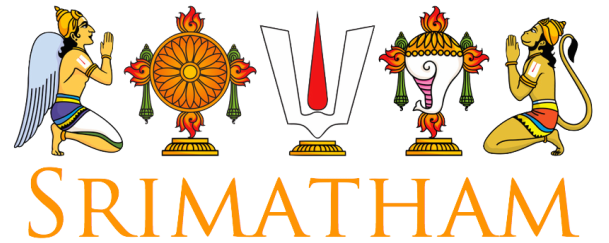Many Srivaishnavas invoke the “opinions” and “rulings” of a nebulous group “acharyas” as if they were, a united, congruous, and harmonious band of divine beings and like the Catholic Pope “infallible”. Yet we know that the “acharyas” were many – Ramanuja appointed 700 simhasanadhipatis. (We hear nothing about the 300 women teachers that he also appointed!). All these men (and women) were very much human beings with the disposition (svabhava) that is natural to the species. They often disagreed in their views and many learned acharyas wrote complex polemic works refuting each others arguments. Hence we have the classical Vadagalai/Tengalai divide and the 18 points of doctrinal dispute – which are still not resolved till this day! There is no Srivaishnava “pope” and no unitary body issuing “fatwas” – each and every acharya and matham is independent and can make up their own minds on doctrinal points and matters of interpretation. If you approach three acharyas today on any major issue you will probably have at least two opinions. (Please note that there is often also bitter rivalry between acharyas of the same faction!).
When such be the case, it is important to understand that the acharya is a guide and counselor on the spiritual path and the one that formally establishes our connection with Sriman Narayana (a connection which was never lost and is irrevocable, perpetual and natural – one is advised to choose a personal acharya and after testing him (or her) to ensure that what is taught is (a) in the spirit of Ramanuja’s teachings, (b) is reasonable and practicable and (c) benefits all beings – one should then surrender to the guidance and teachings of such a person.
To invoke the tired phrase “our acharyas have said …….. ” — is vague, general and unhelpful and ultimately a cop-out from actually using our intelligence.
Krishna said to Arjuna in the 18th chapter – “reflect well over all that I have taught you and then follow the teachings as you will” – there was no “command” to “do as I say because I am God” – but use your intelligence and reason and make up your own mind.
Vedanta in general is a methodology of
(1) sravana – listen to the teachings
(2) manana – reason, apply logic and reflect upon the teachings and
(3) nididhyasana – meditate upon and REALISE those teachings in your own life — the ultimate goal of Vedanta is to bring about personal transformation in the here and NOW. To manifest all the atma-gunas of loving kindness, compassion, generosity etc.

 RSS Feed
RSS Feed